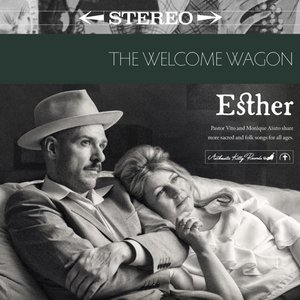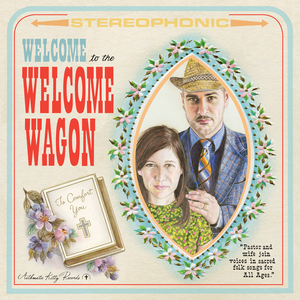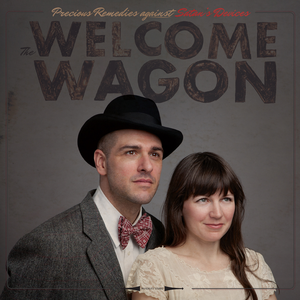Zoek artiesten, songs en albums op in onze database.
- Esther
- Isaiah, California
- Bethlehem, a Noble City
- Knocking on the Door of Love
- Have Mercy on Us
- Consolation Blues
- Matthew 7:7
- I Know You Know
- Noble Tree
- Lebanon
- Nunc Dimittis
- Welcome To The Welcome Wagon (2008)
- Up On A Mountain
- Sold! To the Nice Rich Man
- Unless The Lord The House Shall Build
- He Never Said a Mumblin' Word
- Hail To The Lord's Anointed
- But For You Who Fear My Name
- American Legion
- You Made My Day
- Half A Person
- Jesus
- I Am A Stranger
- Deep Were His Wounds, And Red
- Precious Remedies Against Satan's Devices (2012)
- I'm Not Fine
- My God, My God, Parts 1 and 2
- I Know That My Redeemer Lives
- Rice and Beans (But No Beans)
- High
- Remedy
- Would You Come And See Me In New York
- My Best Days, Parts 1 and 2
- Lo He Comes With Clouds Descending
- Draw Nigh
- The Strife Is O'er
- God Be With You Til We Meet Again
- Nature's Goodnight


The debut album by The Welcome Wagon unveils a ramshackle sing-a-long enterprise of a Presbyterian pastor (the Rev. Vito Aiuto) and his wife (Monique) wrestling out the influences of folk music, religion, popular culture, and church tradition in a collection of songs that is as soulful as it is good-humored. This gorgeous brew is reflected in the group’s repertoire, which unflinchingly consolidates a vast history of “sacred” song traditions: from Old Testament psalms, to Presbyterian Psalters of the 17th century, to iconoclastic pop innovators of the 1960s (The Velvet Underground), to charismatic Catholics of the 1970s (Lenny Smith), and into the melancholy lovelorn pop of the 1980s (The Smiths). There are even a few originals. Armed with a particleboard parlor guitar and a plastic glockenspiel, pastor and wife stumble their way through an arresting catalog of hymns—hallowed and unholy—with the simple desire to know their Maker—and to know each other—more intimately. The result—due, in part, to producer/arranger Sufjan Stevens—is an awe-inspiring collection of hymns, pop covers, and originals that render soulful stunts from quiet skirmishes of home recordings. Gathering together a camaraderie of musical helpers (among them members of Vito’s church: a gospel choir, lap steel guitar, upright bass, and a brass ensemble), Sufjan enlivens The Welcome Wagon’s quaint haberdashery of songs with epic flourishes, drawing out allusions to honky-tonk, Broadway theater, and funk with the curatorial eye of an over-excited musicologist. The final product results in a stunning cross section of rehearsals and home recordings serendipitously captured in living rooms, churches, and home studios across Brooklyn and Queens over the course of some eight-odd years. The Welcome Wagon observe a musical tradition conjoined with marriage that pays tribute to a long line of iconic couples—Johnny Cash and June Carter, Sonny and Cher, Ike and Tina, Captain and Tennille, and more recently, The White Stripes. The Welcome Wagon also reside in the fussy category called “church music,” where family and theology have long accompanied the musical deeds of married partners: the Original Carter Family, Bill and Gloria Gaither, and Mom and Pop Winans are a few examples. You’d be hard pressed to call the Welcome Wagon a groundbreaking supplement to the genre of gospel duos. They are not flashy performers. Their hymns— when stripped of a producer’s vigorous arrangements—are modest, understated, and idiosyncratic shrugs compared to the furious pathos of Blind Willie Johnson and his wife Willie B., or the bluesy emotion of The Consolers. But the apparent lack of hyperbole and didacticism, the absence of rhetorical drama and religious fervor are what make the music of the Welcome Wagon so fascinating. It doesn’t impose its religious pitch on the listener with hyped up garnishes of sound; it merely conveys the deepest of convictions with the deadpan verdict of a surgeon. Sure, their debut album unveils showy guitar riffs, piano codas, harmonica solos, a rowdy chorus, and an imposing flourish of brass instruments like wartime canons. But at the heart of it—if you really listen carefully—there’s really just a pastor and his wife tentatively singing in the quiet privacy of their own home. 1. Up On A Mountain 2. Sold! To The Nice Rich Man 3. Unless the Lord the House Shall Build 4. He Never Said A Mumblin' Word 5. Hail To The Lord's Anointed 6. But For You Who Fear My Name 7. American Legion 8. You Made My Day 9. Half A Person 10. Jesus 11. I Am A Stranger 12. Deep Were His Wounds, And Red Read more on Last.fm.

As the twelfth year of the twenty-first century dawned, the economy was still in the tank, jobs were still scarce, health care was still a mess, and White House hopefuls were bickering and backbiting like there was no tomorrow. People were sick and tired of it all; heck, everyone was sick and tired, period. The masses needed some good medicine, something a lot like Precious Remedies Against Satan’s Devices. Not the 17th century Puritan classic by Thomas Brooks – though that book’s a fine place to start – but the new album of the same name by The Welcome Wagon, the musical duo of Vito and Monique Aiuto, a Presbyterian pastor and his wife. The couple seeks solace in song – for themselves, their congregation, and their listeners. The 13 tracks on Precious Remedies provide a much-needed healing balm, very much like the one Brooks describes in the preface to his old devotional: “A special salve for every spiritual sore, a special remedy against every spiritual malady, a special plaster against every spiritual wound. Food to nourish you, a staff to support you, a guide to lead you, a fire to warm you, and springs of life to cheer and refresh you.” If a book can promise all that, can an album too? Vito and Monique think so. “We’ve always thought of our music as a gift from God – to us, to the people we make it with, and to anybody who listens and enjoys it,” says Vito. “It’s always had this spiritual aspect to it, and for this album, we think of it as music that serves as spiritual medicine.” It’s an apt sequel to their critically acclaimed 2008 debut, Welcome to the Welcome Wagon. Here, Vito and Monique simply throw those welcoming arms open wider, inviting the listener to join them for 51 minutes of church. Precious Remedies begins by telling it like it is: “I’m not fine / And you’re not fine / And we’re not fine together,” they proclaim before easing into the chorus of “Lamb of God, you take away the sin . . .” And with that opening confessional, church is in session. Vito explains: “This album has a somewhat liturgical structure, ordered loosely like a worship service. It begins with the existential and cosmic dread of ‘I’m Not Fine,’ immediately followed by ‘My God, My God, Parts 1 & 2,’ a prayer that rails against God’s seeming absence from this world and our lives. The words are adapted from the prayer of Jesus while he hung on the cross. “It continues with the assurance of redemption (‘I Know That My Redeemer Lives’), which then extends to friendship with God and with one another (‘Rice & Beans,’ ‘High’).” About those last two titles . . . “Rice & Beans (But No Beans)” is a whimsical ditty about how community helps us thrive in difficult circumstances: “Phone cut off, worn through shoes / Check may bounce, rent come due / At the end of the day I’m glad to have a friend like you.” And then there’s “High,” a 1992 classic from The Cure. Vito sings it mostly as a love song to Monique – “When I see you take the same sweet steps you used to take / I know I’ll keep on holding you” – but says “it could be any kind of love or friendship. It’s a key part of who we are and what we do in our church service. After the confession of sin, we say the assurance of pardon: ‘Because we’ve been reconciled to God through Jesus Christ, we can also be reconciled to one another. The peace of the Lord be with you. Greet those around you with the sign of Christ’s peace.’ I think of this part of the record as an affirmation of the ability to love – your husband or your wife or your friend or whatever, because you’ve been reconciled to God in Christ.” “A pastor is supposed to care for people, to help them to love God, to engage with their lives and their joys and their sorrows,” Vito says. “I’m only interested in writing music that will speak to that” Still, we need a “Remedy” – here, a cover of a 2007 David Crowder song of the same name (“The broken and used / Mistreated, abused . . . / He is the remedy.”) And “Would You Come & See Me in New York?” is a tribute to Vito’s late father – and to “any people you wish could be with you, even people you might never see again in this life. There’s a certain sadness to it.” Ditto “My Best Days, Parts 1 & 2,” which acknowledges life’s struggles, culling its lyrics from John Donne’s “Holy Sonnet 19” (“Those are my best days / When I shake with fear”). Ah, but then an explosion of celebration, as the album rolls into a string of tracks bursting with hope, joy, and resurrection: “Lo, He Comes with Clouds Ascending” (adapted from several 18th century writers, including Charles Wesley), “Draw Nigh & Take the Body of the Lord” (from a late 7th century manuscript by Irish monks), and “The Strife Is O’er” (from a 17th century German Jesuit collection). And then, as any proper church service does, it ends with a benediction and a postlude, respectively: “God Be with You Until We Meet Again” and “Nature’s Night,” the latter which Vito calls “a quiet snapshot of what this music sounds like when it is being born in the Aiutos’ home.” Vito says his songwriting is informed by his work as senior pastor at Resurrection Presbyterian Church in Brooklyn’s Williamsburg neighborhood. “A pastor is supposed to care for people, to help them to love God, to engage with their lives and their joys and their sorrows,” he says. “I’m only interested in writing music that will speak to that. I’m writing as a pastor, wanting these songs to speak God’s truth into those situations.” Those who enjoyed the Welcome Wagon’s debut album will notice their distinct sound again here – loose, jangly, comfortable, a gathering of friends making music together. It’s at times jaunty and toe-tapping, at others quietly contemplative, an alt-folk gem that sounds very much like it comes out of the Asthmatic Kitty camp. But while the first album was recorded over the course of eight years in various venues, this one was done in five days at the library of an old rectory in Brooklyn. And while recording artist and AK co-owner Sufjan Stevens produced WW’s first album, he’s less noticeable on this collection, produced by Alexander Foote, who also plays guitars, organ, autoharp, percussion, and some piano. (Stevens does play banjo and piano and sings in the choir on several songs here.) The rectory library at St. Andrew’s House – where Stevens has also recorded some of his own music – was a striking and acoustically apt place to make an album. “It’s a place we love,” says Vito, “and it’s also really gorgeous.” But they recorded it in mid-August, when the cicadas were having a raucous field day throughout New York, perched on the trees right outside the windows – and screaming their 120-decibel songs all day long. “It actually became a serious problem,” says Vito. “They’re almost distractingly loud, even on the finished project; you can especially hear them in the first 30 seconds of ‘High.’ But we just thought, Well, we’re here. We have a week to do this. We don’t have everything we want, but let’s just embrace the limitations. Besides, these songs have been banging around in my head for years, and I just wanted them out.” You’ll be glad he did. Precious Remedies for everyone. Read more on Last.fm.